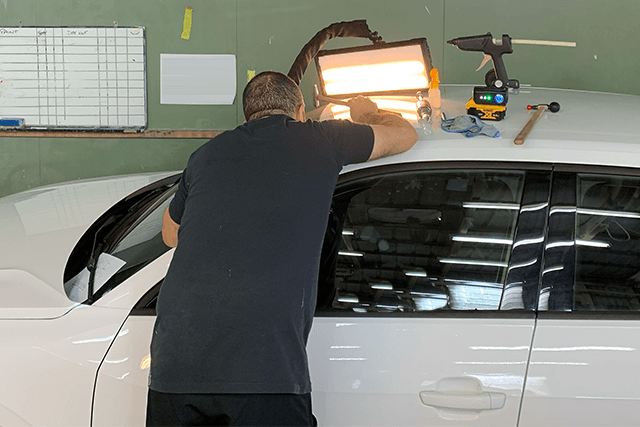How to use Paintless Dent Removal tools
Matilda Douglas-Henry
Paintless Dent
Removal (or PDR) is one of the most popular and well-used panel beating
services out there. Panel beaters use a variety of tools and methods catered to
their individual style and taste, and therefore we recommend leaving it to the
professionals rather than resorting to DIY methods. It’s still highly
beneficial to learn more about PDR as a car owner; in this article we will
discuss:
- What Paintless Dent Removal is
- Different types of PDR tools
- How to use PDR tools

What is Paintless Dent Removal?
Paintless Dent
Removal is one of the most commonly used procedures by panel beaters, and is
exactly as the name suggests: panel beaters use a series of tools and
techniques to remove certain forms of damage from your vehicle without needing
to repaint.
Depending on the severity of the damage, PDR is not always an option—but when it is, it’s by far and away the quickest and most effective measure to getting your car back on the road again[1]. (It won’t hurt your pockets, either.)
What are different types of Paintless Dent Removal tools?
Here at DingGo, we recognise the value of raising awareness around the tools and methods that panel beaters use to get your panels looking good as new again. We see this article serving that purpose: we always recommend going to a qualified panel beater rather than testing out DIY solutions, especially when the damage only requires PDR which is a cheap fix even when done professionally.
Keeping that in mind,
here are some of the most common tools used for Paintless Dent Removal:
-
Hammers: Panel beaters rely on a variety of
different hammers for PDR; many would attest that the trustworthy hammer is
their most valuable tool. Some of the hammers involved in PDR are pick hammers (able to pick up dents
from the inside), flat faced and crown-faced (limit surface contact),
and heavy roughing hammers (used to
“rough out” the panel prior to final shaping).
-
Dollies: The dolly is a complementary tool to
the hammer, and stabilises the affected panel while the hammer hits it back into
place.
-
Slappers: A long object made of wood, steel or
rubber that “shrinks” the “high” point of impact on the panel.
-
Puller tab/hot glue: Some PDR procedures involve attaching hot glue to a tab
and popping the dent back into place. This is a popular method for DIYers, and
while it may be a quick fix for smaller dings and dents, it’s more of a
temporary solution and largely frowned upon by panel beaters[2].
How are Paintless Dent Removal tools used?
It can’t be said
enough that innovation and creativity are a significant component of a panel
beater’s job. Each technician will approach PDR a little differently, but
there’s certainly some common ground, which we will outline below.
Above all else, the hammer/dolly relationship is essential to Paintless Dent Removal. As we mentioned earlier, PDR uses hammers that are differently shaped and weighted, and the dollies will be different shapes to cater to each panel. There are two key hammer/dolly methods that will be used in particular contexts: “on dolly” and “off dolly”.
“On dolly” occurs when the hammer hits the centre of the dolly with the panel squished tightly between them. This method is used when there are small creases or dings in the panel that can be smoothed out along the curve of the dolly.
“Off dolly” is just how it sounds: the hammer misses the dolly face entirely; the dolly is there to stabilise the panel while the hammer pushes the metal back into shape. This approach would be used in the case of a more serious dent in the panel with a large point of impact. Once the large depression is basically gone, the panel beater would likely return to working on-dolly to restore the original shape[3].
Conclusion
Panel beaters are
experts in their craft, which is especially on display with the feat of
Paintless Dent Removal. Read more about the cost of PDR if your vehicle is in need of
attention, and use DingGo’s quick quotes service today.
